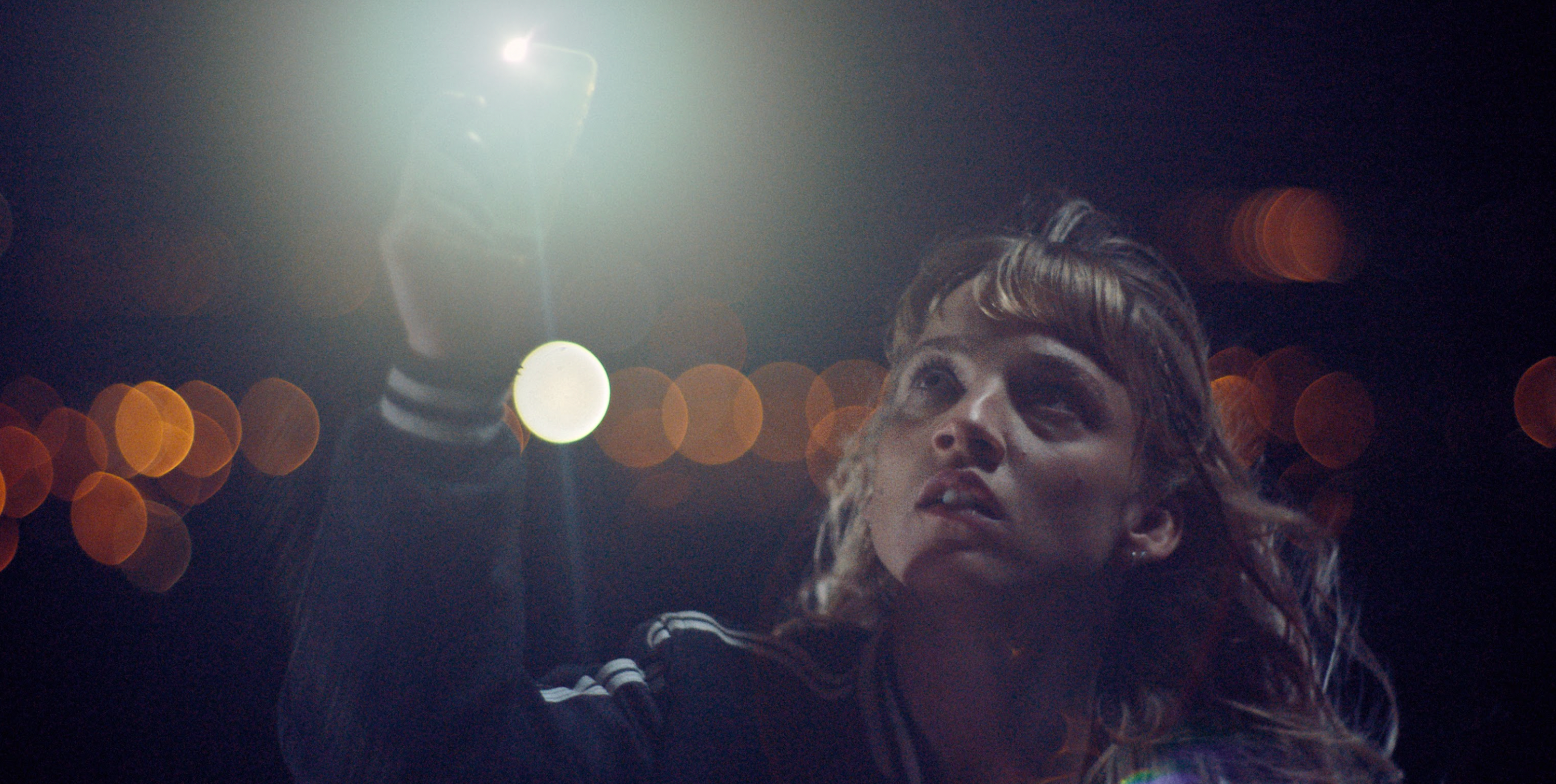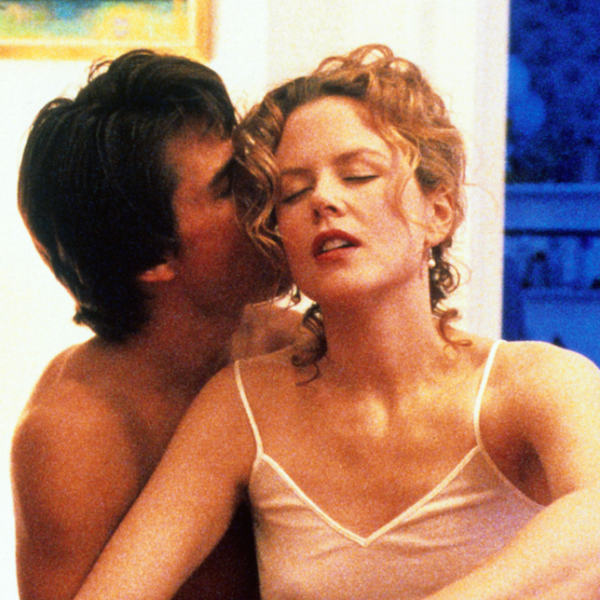Known for his animation work, French filmmaker Jérémy Clapin is fascinated by the parts of ourselves that life forces us to leave behind. More specifically, he’s fascinated by their absence, and what it means for someone to feel “whole” in the aftermath of a profound loss.
2019’s miraculous “I Lost My Body” told the story of a severed hand as it crawled across the suburbs of Paris in search of the man to whom it once belonged. With “Meanwhile on Earth,” his live-action debut, Clapin returns with a similarly beguiling — if much less resonant — approach to body horror, this one about a grieving 23-year-old nurse who’s told that she can reconnect with her missing brother: an astronaut presumed dead after he disappears from a mission in deep space.
Elsa (Megan Northam) is so desperate to hear Franck’s voice again that she would presumably do anything it told her, which proves to be a huge boon for the symbiotic alien species her brother may have encountered in the cosmos. Whispers in the night tell her that she has the power to bring Franck back — all she has to do is deposit a translucent white seed into her left ear and follow the instructions that it speaks to her.
Presented with a chance to patch up the gaping hole in the center of her universe, Elsa doesn’t even hesitate to shove E.T.’s AirPod directly into her skull. Her pain is so raw that she can only conceive of grief as a problem to be solved (as opposed to considering it as a solution unto itself), and there isn’t a single thing on Earth or anywhere else that she wouldn’t try in order to stop hurting. Alas, nothing hurts a broken person like the empty promise of being “made whole” again, and it isn’t long — mere seconds of screentime, really — before Elsa begins to appreciate how difficult it can be to get these intrusive thoughts out of her head. In this case, that’s partially because an alien transmitter has wielded itself to her soft tissue so tightly that she couldn’t pull it out of her ear without losing half of her brain along with it.
Like grief, Elsa and the symbiote are hostages to each other. The human is told that four other extraterrestrials are in need of host bodies, and that it will be Elsa’s job to procure them if she hopes to see her brother again and/or survive; it’s not an invasion, it’s simply “the end of one path” for the alien species and the start of another.
At first, Elsa has no trouble finding potential targets — the man who sexually assaults her is an easy choice. But things get more complicated from there, even though she works at a nursing home full of old people who might offer a convenient way to run up the numbers. As her bloody task inches towards completion, Elsa will have to reckon with the fact that her reality has changed in the aftermath of Franck’s disappearance. She will have to accept that she’s reached the end of one path before she can begin to look for another.
Running a quick 87 minutes that zag from slasher-adjacent kill sequences to a series of tender 2D animated sequences in which Elsa draws her shared memories of Franck into a nebulous space adventure, “Meanwhile on Earth” is a film that feels more compelled by its premise than it is by its story, but Clapin is able to suffuse it with the same ethereal hauntedness that brought “I Lost My Body” to life. Much of the credit for that belongs to composer Dan Levy (a founding member of pop duo The Dø), whose shimmery soundscapes hold this jagged and unformed movie in a bittersweet embrace that allows it to adopt so many different modes — much as grief permits all manner of feeling.
Outright murder might be a step too far for Elsa, but it’s a testament to Northam’s frayed nerve of a performance that we can’t really know for sure until the very end. Self-possessed but spiraling from the moment we meet her (when she’s spray-painting graffiti onto the memorial statue that her rural French town has made for her brother), Elsa isn’t in denial exactly, but she’s struggling to accept that the life that’s still available for her to live isn’t the same one that she led prior to Franck’s disappearance.
“Meanwhile on Earth” takes an opaque approach to its heroine’s psychology, and we barely get so much as a temp check on how the rest of her family has been affected by her brother’s absence, but it’s clear that Elsa has been uniquely paralyzed by their loss. She’s stuck in place, left with little to do beyond listening to signs from the universe; while it’s unclear if she ever expected Franck to return, it’s wordlessly palpable that she feels like the keeper of his sacred memory, and that she fears that finding a new future for herself would be akin to erasing the past she once shared with her sibling.
It’s heart-tugging stuff even in the broadest of strokes, and would likely have been even more effective if Clapin had slowed down to detail Elsa’s relationship with Franck. But the writer/director prefers to traffic in ineffable feelings rather than specifics, and his latest film — much like his previous one — is essentially a mood piece that’s pierced by occasional moments of acute clarity. Certain scenes manage to create their own impact (“We can be happy,” Elsa’s mom tells her, “but we have to choose to be”), but even for all of its splattery violence and veiled sci-fi threat, this is a soft and precious movie that feels most in tune with its messaging during the quiet beats when Elsa looks to the stars in heartsick wonder or wanders through the forest, her footsteps careful not to fracture the glassiness of Levy’s score.
Once again, Clapin is more determined to crystallize the essence of loss than the specifics of grief, and more focused on the need to become whole than he is on the work of doing that, but “Meanwhile on Earth” is too unformed to land with the same power as “I Lost My Body.” There, Clapin was able to draw a world of wistful sorrow from the ground up, but here he struggles to mine a similar depth of feeling from a world that wasn’t created to serve his purpose, and often seems to have a contrary agenda of its own. While Clapin ultimately lands on an encounter that puts Elsa’s dilemma into clear focus, that ending is almost too grounded for a film so vague that its flesh and blood protagonist starts to become as abstract as her missing brother; it’s hard to invest in the idea of Elsa becoming whole again in a movie that grows increasingly splintered as it goes along.
Be that as it may, Clapin’s singular ability to sketch the impression of loss survives the shift to live-action in a way that allows this movie to feel indivisibly honest even as it frays apart. “Not everyone finds their path,” Elsa’s mother cautions her at one point, and while I’m not entirely convinced of where Elsa’s own search leaves her in the end, it’s rare to see the all-consuming nature of that search — the feeling of being severed from your own soul, and the desperation of trying to get it back — rendered with the cosmic uncertainty that it demands.
Grade: B-
Metrograph Pictures will release “Meanwhile on Earth” in theaters on Friday, November 8.
Want to stay up to date on IndieWire’s film reviews and critical thoughts? Subscribe here to our newly launched newsletter, In Review by David Ehrlich, in which our Chief Film Critic and Head Reviews Editor rounds up the best new reviews and streaming picks along with some exclusive musings — all only available to subscribers.




